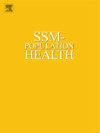Self-regulation and behavioral risk factors for obesity in youth facing multiple adversities
IF 3.1
2区 医学
Q1 PUBLIC, ENVIRONMENTAL & OCCUPATIONAL HEALTH
引用次数: 0
Abstract
Objective
To evaluate the extent to which different facets of self-regulation, including emotion regulation and executive functioning, relate to three target health behaviors associated with obesity risk (i.e., eating, physical activity, and sleep) in youth facing multiple adversities.
Methods
Participants included youth (10–18 years) and their caregivers. Emotion regulation, executive functioning, and subjective health behaviors were measured via self- and proxy-report. Disinhibited eating was assessed objectively. Caregivers reported on sociodemographic and risk indicators. Regression analyses were used to examine associations between self-regulation and health behaviors.
Results
A total of 174 youth and their caregivers enrolled in the study. Youth experienced overall high levels of socioeconomic, academic, and health hardships, as well as high levels of caregiver-reported executive dysfunction. Self-reported emotion regulation difficulties were consistently associated with greater self-reported reward-based eating and sleep disturbances, with effect sizes varying from small to large. Only one facet of emotion regulation, difficulties with emotional awareness, was inversely associated with self-reported physical activity. Caregiver-reported executive functioning was not related to health behaviors.
Conclusions
The current study highlights the potential role of emotion regulation in obesity prevention efforts and identifies unique associations between specific facets of emotion regulation and health behaviors among youth exposed to adversity. Public health and obesity prevention efforts that target emotion regulation and coping skills may be particularly beneficial in promoting health behaviors in this population. Findings underscore the need for future research to examine how broader, multi-level contextual factors influence self-regulation, shape youth's health behaviors, and contribute to long-term obesity risk.
多重逆境下青少年肥胖的自我调节及行为危险因素
目的评估面对多重逆境的青少年,自我调节的不同方面,包括情绪调节和执行功能,与肥胖风险相关的三种目标健康行为(即饮食、身体活动和睡眠)的关系程度。方法研究对象为青少年(10-18岁)及其照顾者。情绪调节、执行功能和主观健康行为通过自我报告和代理报告进行测量。客观评估去抑制饮食。护理人员报告了社会人口统计学和风险指标。回归分析用于检验自我调节和健康行为之间的关系。结果共有174名青少年及其照顾者参加了这项研究。青少年总体上经历了高水平的社会经济、学术和健康困难,以及高水平的照护者报告的执行功能障碍。自我报告的情绪调节困难始终与更大的自我报告的奖励性饮食和睡眠障碍相关,影响大小不一。只有情绪调节的一个方面,即情绪意识困难,与自我报告的身体活动呈负相关。照护者报告的执行功能与健康行为无关。目前的研究强调了情绪调节在肥胖预防工作中的潜在作用,并确定了情绪调节的特定方面与逆境青少年健康行为之间的独特关联。以情绪调节和应对技能为目标的公共卫生和肥胖预防工作可能对促进这一人群的健康行为特别有益。研究结果强调了未来研究的必要性,以研究更广泛、多层次的背景因素如何影响自我调节、塑造青少年健康行为,并导致长期肥胖风险。
本文章由计算机程序翻译,如有差异,请以英文原文为准。
求助全文
约1分钟内获得全文
求助全文
来源期刊

Ssm-Population Health
PUBLIC, ENVIRONMENTAL & OCCUPATIONAL HEALTH-
CiteScore
6.50
自引率
2.10%
发文量
298
审稿时长
101 days
期刊介绍:
SSM - Population Health. The new online only, open access, peer reviewed journal in all areas relating Social Science research to population health. SSM - Population Health shares the same Editors-in Chief and general approach to manuscripts as its sister journal, Social Science & Medicine. The journal takes a broad approach to the field especially welcoming interdisciplinary papers from across the Social Sciences and allied areas. SSM - Population Health offers an alternative outlet for work which might not be considered, or is classed as ''out of scope'' elsewhere, and prioritizes fast peer review and publication to the benefit of authors and readers. The journal welcomes all types of paper from traditional primary research articles, replication studies, short communications, methodological studies, instrument validation, opinion pieces, literature reviews, etc. SSM - Population Health also offers the opportunity to publish special issues or sections to reflect current interest and research in topical or developing areas. The journal fully supports authors wanting to present their research in an innovative fashion though the use of multimedia formats.
 求助内容:
求助内容: 应助结果提醒方式:
应助结果提醒方式:


